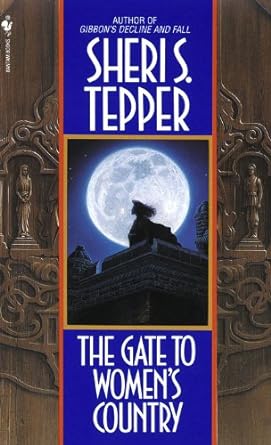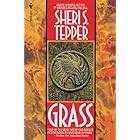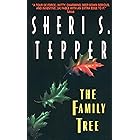| Kindle Price: | $7.99 |
| Sold by: | Random House LLC Price set by seller. |
Your Memberships & Subscriptions

Download the free Kindle app and start reading Kindle books instantly on your smartphone, tablet, or computer - no Kindle device required.
Read instantly on your browser with Kindle for Web.
Using your mobile phone camera - scan the code below and download the Kindle app.



 Audible sample
Audible sample Follow the author
OK
The Gate to Women's Country: A Novel Kindle Edition
Since the flames died three hundred years ago, human civilization has evolved into a dual society: Women’s Country, where walled towns enclose what’s left of past civilization, nurtured by women and a few nonviolent men; and the adjacent garrisons where warrior men live—the lost brothers, sons, and lovers of those in Women’s Country.
Two societies. Two competing dreams. Two ways of life, kept apart by walls stronger than stone. And yet there is a gate between them. . . .
“Tepper not only keeps us reading . . . she provokes a new look at the old issues.”—The Washington Post
“Tepper’s cast of both ordinary and extraordinary people play out a powerful drama whose significance goes beyond sex to deal with the toughest problem of all, the challenge of surmounting humanity’s most dangerous flaws so we can survive—despite ourselves.”—Locus
- LanguageEnglish
- PublisherSpectra
- Publication dateOctober 21, 2009
- File size2793 KB
Customers who bought this item also bought
Editorial Reviews
From Publishers Weekly
Copyright 1988 Reed Business Information, Inc.
Review
“Tepper not only keeps us reading . . . she provokes a new look at the old issues.”—The Washington Post
“Tepper’s cast of both ordinary and extraordinary people play out a powerful drama whose significance goes beyond sex to deal with the toughest problem of all, the challenge of surmounting humanity’s most dangerous flaws so we can survive—despite ourselves.”—Locus
About the Author
Excerpt. © Reprinted by permission. All rights reserved.
As usually happened on occasions like this one, Stavia felt herself become an actor in an unfamiliar play, uncertain of the lines or the plot, apprehensive of the ending. If there was to be an ending at all. In the face of the surprising and unforeseen, her accustomed daily self was often thrown all at a loss and could do nothing but stand aside upon its stage, one hand slightly extended toward the wings to cue the entry of some other character—a Stavia more capable, more endowed with the extemporaneous force or grace these events required. When the appropriate character entered, her daily self was left to watch from behind the scenes, bemused by the unfamiliar intricacy of the dialogue and settings which this other, this actor Stavia, seemed able somehow to negotiate. So, when this evening the unexpected summons had arrived from Dawid, the daily Stavia had bowed her way backstage to leave the boards to this other persona, this dimly cloaked figure making its way with sure and unhesitating tread past the lighted apartments and through the fish and fruiterers markets toward Battle Gate.
Stavia the observer noted particularly the quality of the light. Dusk. Gray of cloud and shadowed green of leaf. It was apt, this light—well done for the mood of the piece. Nostalgic. Melancholy without being utterly depressing. A few crepuscular rays broke through the western cloud cover in long, mysterious beams, as though they were searchlights from a celestial realm, seeking a lost angel, perhaps, or some escaped soul from Hades trying desperately to find the road to heaven. Or perhaps they were casting about to find a fishing boat, out there on the darkling sea, though she could not immediately think of a reason that the heavenly ones should need a fishing boat.
Near the Well of Surcease, its carved coping gleaming with liquid runnels and its music subsumed into the general drip and gurgle, the street began its downhill slope from the Temple of the Lady to the ceremonial plaza and the northern city wall. At street level on the right a long row of craftswomen’s shops stared blindly at the cobbles through darkened windows: candle makers, soap makers, quilters, knitters. On the left the park opened toward the northwest in extended vistas of green and dark, down past the scooped bowl of the summer theater where Stavia would play the part of Iphigenia this summer. Not play, she thought. Do. Do the part. As someone had to do it. In the summer theater. In the park.
A skipping seawind brought scents of early spring flowers and pine and she stopped for a moment, wondering what the set designer had in mind. Was this to remind her of something? All the cosiness of candle flame and gurgling gutters leading toward this sweet sadness of green light and softly scented mist? Too early to know, really. Perhaps it was only misdirection, though it might be intended as a leitmotif.
The street leveled at the bottom of the hill where it entered the Warrior’s Plaza, unrelenting pavement surrounded on three sides by stories of stolid and vacant colonnades. The arched stone porches were old, preconvulsion structures. Nothing like that was built today. Nothing so dignified, so imposing, so unnecessary. The ceremonial space seemed far emptier than the streets behind her. The arches wept for spectators; the polished. stones of the plaza cried for marching feet, the rat-a-bam of drums, the toss of plumes, and the crash of lances snapped down in the salute, kerbam! The plaza sniffled in abandonment, like a deserted lover.
Oh yes, the journey had been meant as a leitmotif, she could tell. The plaza made it clear.
On three sides of the plaza, the colonnades. On the fourth side, the towering wall, high-braced with buttresses, glimmering with mosaics, pierced by the Defender’s Gate, the Battle Gate, and the Gate of the Warriors’ Sons, which comprised a triptych of carved timbers and contorted bronze depicting scenes of triumph and slaughter. The Defender’s Gate was at the left of this lofty arrangement, and she stood close to it for a long time—perceiving herself before it as though from a front-row-center seat, the compliant lines of her cloak melting before the obdurate metal—before reaching out with her staff to knock the requisite three times, not loudly. They would be waiting for her.
The small door at the base of the great portal swung open; she walked with every appearance of calm down the short corridor beyond. In the assembly room she found an honor guard. And Dawid, of course.
How could she have forgotten he was fifteen? Well, she hadn’t. She was thirty-seven, so he was fifteen. She had been twenty-two when… when everything. All this pretense that the summons was unexpected was really so much playacting, a futile attempt to convince herself that something unforeseen might happen despite her knowing very well what the plot required. Despite Dawid’s ritual visits on holidays, his twice-yearly homecomings—during which the initial shyness of the original separation had turned to fondness, then to shyness again, finally becoming the expected, though no less wounding, alienation—despite all that, she had chosen to go on thinking of him as she had when he was five and had gone into the hands of the warriors.
So, now, she must guard against speaking to that child, for this was no child confronting her in his polished breastplate and high helmet, with pouted lips outthrust. No child anymore.
“Dawid,” she said formally, bowing a little to indicate the respect she bore him. And “Gentlemen,” for the respect she bore these others, also. One had to grant them that; one could grant so little else. She risked one raking glance across the ranked faces above the shining armor, subconsciously thinking to see faces that she knew could not be there. Those that were there were young. No old faces. No old faces at all.
“Madam,” intoned one member of the host. Marcus, she thought, examining what she could see of his visage between the cheek and nose guards of his helmet; Marcus, probably, though it might have been another of her sister Myra’s sons—all three looked disconcertingly alike and had, even as babies. “Madam,” he said, “your warrior son greets you.”
“I greet my warrior son,” the actor Stavia said while the observer Stavia annoyed herself by weeping, though inwardly and silently, as befitted the occasion.
“I challenge you, madam,” said Dawid. His voice was light, very light, almost a child’s voice, still, and she knew he had been practicing that phrase in the shower room and in corners of the refectory, no doubt listening with heartbreaking attention for the vibrant echo of command. Still, it quavered with a child’s uncertainty.
“Oh?” she questioned, cocking her head. “How have I offended?”
“During my last homecoming”—he gave the word the aversive twist she had believed only a mature warrior could give it, “homecoming,” as though it were something dirty; well, perhaps it was—“you made a suggestion to me which was unworthy of my honor.”
“Did I, indeed?” The actor Stavia was properly puzzled. “I cannot remember any such.”
“You said,” his voice quavered. “You said I would be welcome to return to my mother’s house through the Gate to Women’s Country.”
“Well, and so you would be,” she said calmly, wishing this farce were done with so she might go home and weep. “So are any of our sons.”
“Madam, I summoned you here to tell you that such a suggestion offends my honor! I am no longer your son. I am proud to name myself a son of the warriors. I have become a Defender!”
So, and well, and what had she expected? Still, for a moment she could not respond. The observer Stavia held the actor in thrall, just for this moment, seeking in that face the face of the five-year-old Dawid, mighty hunter of grasshoppers, thunderer on the toy drum, singer of nursery rhymes, leading contender in the skipping race from home to candy shop. That level-browed, serious-eyed, gentle-lipped child. No more. No more.
No, it was all bronze and leather now. The Marthatown garrison tattoo was on his upper arm. He had a cut on his chin where he had shaved himself, though his skin looked like a baby’s. Still the arms and chest were muscular and almost adult, almost a man’s body. Fit for love. Fit for slaughter.
Get on with it, wept the observer Stavia.
“Then I relinquish all claim to you, Dawid, son of the warriors. You need not visit us again.” A pause for the words which were not obligatory but which she was determined upon. Let him know, even now, that it cut both ways. “You are not my son.” She bowed, believing for a moment that the dizziness which struck her would prevent her getting her head up, but then the actor had her up and wheeling about, finding her way almost by instinct. Women could not return through the Defender’s Gate. There was a corridor here to the left, she told herself, remembering what she had been told and managing to get into it with level tread, not breaking stride, not hurrying or slowing. Even the hiss behind her did not hurry her steps. A serpent’s hiss, but by only a few, possibly only one set of lips, and those not Dawid’s. Stavia had played by the rules since Dawid was born, and all those metal-clad automatons knew it. They could not hiss her in good conscience, and only zealots would do it. Despite them, she would not hurry. No, no, and no, the thing must be done properly if it had to be done at all.
Product details
- ASIN : B002SXIEXC
- Publisher : Spectra (October 21, 2009)
- Publication date : October 21, 2009
- Language : English
- File size : 2793 KB
- Text-to-Speech : Enabled
- Screen Reader : Supported
- Enhanced typesetting : Enabled
- X-Ray : Not Enabled
- Word Wise : Enabled
- Print length : 332 pages
- Best Sellers Rank: #301,961 in Kindle Store (See Top 100 in Kindle Store)
- #305 in Military Fantasy (Kindle Store)
- #881 in Military Fantasy (Books)
- #2,808 in Dystopian Science Fiction (Kindle Store)
- Customer Reviews:
About the author

Discover more of the author’s books, see similar authors, read book recommendations and more.
Customer reviews
Customer Reviews, including Product Star Ratings help customers to learn more about the product and decide whether it is the right product for them.
To calculate the overall star rating and percentage breakdown by star, we don’t use a simple average. Instead, our system considers things like how recent a review is and if the reviewer bought the item on Amazon. It also analyzed reviews to verify trustworthiness.
Learn more how customers reviews work on AmazonCustomers say
Customers find the book great, interesting, and essential reading. They appreciate the imaginative storyline, complexity, and dramatic flair of the plots. Readers describe the book as thought-provoking, intriguing, and provocative. They also praise the writing quality as spectacularly well-written and readable.
AI-generated from the text of customer reviews
Customers find the book interesting, essential, and a joy to read. They say it's excellent, entertaining, and a great book for discussion.
"...It's a work of fiction and it is excellent, it has anything one could wish for in a story, drama, love, war, lies, suspense and on and on...." Read more
"...This is a very interesting novel, which attempts to blend history and social commentary...." Read more
"...It is certainly worth a read for anyone with an interest in speculative or alternative history fiction as well as post-apocalyptic fiction." Read more
"...Sometimes labeled feminist scifi it remains a great story well worth reading." Read more
Customers find the story imaginative, complex, and excellent. They also describe the book as a provocative and literary novel. Readers mention it's one of the best dystopias they have ever read.
"...It's a work of fiction and it is excellent, it has anything one could wish for in a story, drama, love, war, lies, suspense and on and on...." Read more
"Sheri S. Tepper's The Gate to Women's Country is a provocative and literary novel set in a post-apocalyptic world where women are attempting to re-..." Read more
"...one of the most rewarding things about it is watching the expertly crafted plot unfold, doling out tiny hints and clues, but never truly revealing..." Read more
"...The story has some interesting ideas, but it just isn't believable enough to work for me." Read more
Customers find the book thought-provoking and intriguing. They say it has interesting concepts of how society might develop. Readers also mention the plot unfolds, doling out tiny hints and clues.
"...From the moment I began to read it, it took off. Sheri S. Tepper's ideas are so original and her characters are so well developed you can not help..." Read more
"...about it is watching the expertly crafted plot unfold, doling out tiny hints and clues, but never truly revealing everything until the very end...." Read more
"...and readable; what makes it such a good work is its thought-provoking nature. I treasure this book and have no hesitation recommending it to anyone." Read more
"...is a very dangerous novel that has a clear point of view and presents it persuasively in the context of an exceedingly enjoyable adventure story...." Read more
Customers find the writing quality of the book spectacular, serviceable, and readable. They also say the author is wonderful.
"...the Trojan War as counterpoint to her own story, giving it a very literary quality. The characters are interesting, the plot moves well...." Read more
"...or elegant book--though there are isolated moments--but the writing is serviceable and readable; what makes it such a good work is its thought-..." Read more
"...The writing was interesting and the author made excellent use of unreliable narrator that left you believing even after that particular character..." Read more
"...I find this book to be well-written, with an easy rhythm, to be enjoyed by both sexes." Read more
Reviews with images
Especially relevant today
-
Top reviews
Top reviews from the United States
There was a problem filtering reviews right now. Please try again later.
To be fair, Tepper acknowledges that not all men are war-mongers (some - the few who choose to live in Women's Country - are shown to be sensitive, strong, and intelligent). Additionally, several of her female characters (Stavia's older sister, Myra, for example) are silly, stupid, and ridiculous. But the basic premise here is that without certain male-linked violent traits there would be no wars.
The story is remarkably similar to Pamela Sargent's The Shore of Women, which was published two years before Women's Country. Both novels involve a post-apocalyptic world where women and men live separate lives. In both societies, male children are separated from their mothers and sent to live in the garrisons at age five. Both stories involve central female characters who (for different reasons) go off on secret journeys with a man from the garrisons. In both, the traveling couples come across other societies where women are mistreated and abused. The perspective of the two authors is very different, however; Tepper seems convinced that the only way to achieve human peace is through the slow and careful removal of male-linked violent traits from the species, while Sargent challenges the idea that there's anything inherently wrong with being male (in all its ramifications).
I must admit Tepper's society bothers me. By isolating their males in military garrisons, her women seem to be fostering the continuation of the very violence they abhor. If boys are exposed only to fighting and military codes of honor, and are denied access to books, education, art, and even work (the men pretty much do nothing but march and drink and consort with prostitutes), it's hard to imagine them turning out any way other than war-mongers. Sargent's men, at least, are taught a very sophisticated religion which gives them something to fight for. The only "religion" Tepper's men have is their devotion to the phallic-shaped pole which is the center of their military games and rituals.
This is a very interesting novel, which attempts to blend history and social commentary. Tepper uses the stories of the Trojan War as counterpoint to her own story, giving it a very literary quality. The characters are interesting, the plot moves well. And you will definitely want to talk about it once it's over (so read it with a friend!). I think Tepper questions her own thesis at times (as Stavia and Morgot certainly do) - and readers are free to question along with her. Overall, it's a good, thought-provoking read.
Although this will require a change in human nature, it can be managed by a simple strategy. Women will marry warriors, but their children will secretly be fathered only by the peaceful "servitors." The women and servitors will raise the children apart from the quasi-military cohorts of men. At puberty, boys will be sent to live with their nominal fathers; while girls must choose (without knowing, though with hints from their lessons) to do the same as their mothers.
Thus everyone gets what they want: militant men get honor and the "naming of sons," women get a peaceful home, children, and a spouse-substitute help-meet, boys get a heroic role model until they are old enough to recognize the quiet power of the servitors.
At age 25, though, the young men face a choice; they may choose conflict and stay with the men, or they may return through the gate to Women's Country and become servitors—and be scorned by their military mates, their commanders and their nominal fathers.
Of all Tepper's novels, this is the one in which I find the most philosophic agreement. For one thing, the "pacifist" men are not helpless wimps; the servitor Joshua and the returned Corrig are both powerful fellows versed in self-defense. For another, women are not either/or: some are strong, but focused on family; some are high-achievers, wielding leading their communities, but puzzled by rebellious daughters.
There is little of the "woman alone against men" flavor of Tepper's later novels. Households are woman plus man plus children, and only the division of woman-led Town versus warrior-led Garrison foreshadows the author's later work.
Tepper's novels often carry an obvious theme accented by a more-subtle leitmotif. "Gate" is one of the easiest to parse for these elements. Stavia and her mother Morgot, throughout the tale, are occupied with studying their lines to play a part in a recurrent performance of "Iphegenia at Ilium," a reworking of the Dionysian play "The Trojan Women" The Trojan Women.
The lines the women recite all concern the suffering of women in the aftermath of war, an overt reason for the divided structure of their utopian (or protopian) society. Underlying this overt theme is the careful husbandry of humanity in the hands of the women, symbolized by Finns with their reindeer herds. Even nearly thirty years after it was written, this poetic coupling of "why" with a plausible "how" gives power to the struggle to move humanity beyond war.
Together, they make this "Gate" worth opening.










